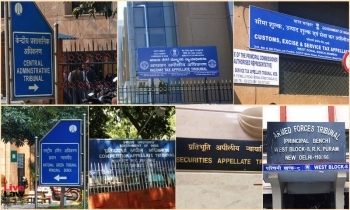
.png) Dr Suresh Mathew
Dr Suresh Mathew

“If the government has the last laugh, what is the sanctity of the selections made by us after conducting interviews? We are very, very unhappy the way in which things are going on and how the government has been acting (on appointments to tribunals).” These words from the Supreme Court Bench, headed by Chief Justice N.V. Ramana, sum up the apex court’s anguish over the executive’s apathy towards tribunals which are quasi-judicial institutions. It is important to note that the tribunals play a vital role in settling disputes in taxes, service matters, administrative decisions, environment issues and many more. There are 19 tribunals whose main objective is to streamline and speed up justice delivery to the victims.
Unfortunately, after the Modi government came to power, like in many other cases, efforts were made to clip the wings of the tribunals by tweaking the law. Since the changes distorted the very purpose of tribunals, the Supreme Court struck down the arbitrary rules. Not to be cowed down, the government came out with an Ordinance to bypass the apex court’s verdicts. In the government’s tussle with the judiciary, appointments to tribunals are pending since 2017. According to reports, the National Company Law Tribunal, where more than 21,000 cases are pending, has only 38 members out of the sanctioned strength of 63. In the Armed Forces Tribunal, only 11 of 34 posts are filled, while more than 18,800 cases are pending for disposal. In the Central Administrative Tribunal (CAT), which deals with service matters, there are only 36 members against a sanctioned strength of 65. The fate of many other tribunals too is no different. And here is a government which preaches ‘more governance, less government.’
The lackadaisical manner in which the Modi government deals with tribunals is similar to its unconcern to the functioning of many other institutions. Probably in a first of its sorts, the 17th Lok Sabha, which is reaching its half-life, is without a Deputy Speaker. The Constitution mandates that the Speaker and the Deputy Speaker should be elected at the earliest. The previous 16 Lok Sabhas followed this obligation in letter and spirit. The present regime’s inordinate delay in fulfilling a Constitutional provision is undemocratic to the core. Another important institution in limbo is the Law Commission of India as the term of its previous Chairperson and the members ended in 2018. The Madras High Court has now stepped in to direct the government to expedite appointment to these posts.
There is a shortage of 465 judges against the sanctioned strength of 1080 posts in the 25 High Courts wherein 60 lakh cases are pending disposal. A government which came to power on the plank of corruption-free administration has not bothered to fill up even the post of the Chief of Central Vigilance Commission, the highest-ranking body which keeps a tab on governmental corruption. With so many top-level posts lying vacant in vital institutions, governance is the biggest casualty. The government’s dilly-dallying on the issue is an affront to democracy and Constitution. It is the manifestation of arrogance of a government which has brute majority in Lok Sabha. Leaving institutions headless and member-less is the surest way to make them toothless.